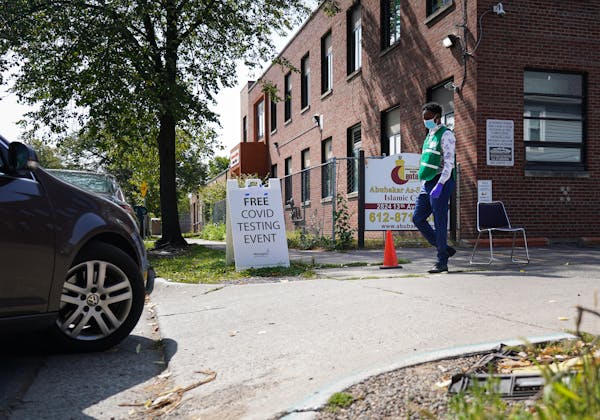University of Minnesota officials are reviewing video of a large weekend gathering that violated campus rules meant to slow the spread of COVID-19.
The Saturday night gathering, outside the four "Superblock" residence halls on the Minneapolis campus, was held just before the start of in-person classes on Monday and was eventually broken up by campus police and U housing staff, the university said this week in a statement.
Video posted by a student on Twitter showed people gathered close together and cheering as a young man stood atop sun-shielding for a pavilion before dropping into the crowd. A caption says 100 to 150 people were in attendance, but a precise count was not known.
Officials are "reviewing any existing video of the event and will follow up with identified students, as appropriate," the U said in the statement. A spokeswoman added by e-mail Tuesday: "This gathering was a violation of the Maroon and Gold Sunrise plan."
That plan says that in order to reopen safely with COVID-19, U students will live and learn almost exclusively within residence halls for at least 10 days. They are not to visit other residence halls or off-campus businesses and residences, and should be back in residence halls by 9 p.m.
The plan also calls on students to wear masks and maintain physical distance. Those who don't follow requirements may face disciplinary action, the U says, including termination of a student's housing contract.
A U spokeswoman didn't specify how the gathering violated U policy but said it took place before 9 p.m. She stressed that the vast majority of students are following the rules by staying home when sick, maintaining physical distance and wearing masks.
"Overall, the university takes an educational and development-focused approach to resolving violations of student conduct expectations," the U said in its statement. "We believe that by focusing on education and restorative justice, we can contribute to the education and development of our students, and ultimately generate more positive behavior than sanctions alone."
The majority of classes at the U's Twin Cities campus are being taught online and started on Sept. 8. That was supposed to be the start date for in-person classes, as well, but they were delayed until Monday after U leaders in August saw outbreaks emerge as other colleges reopened.
Gatherings like the one outside the Superblock residence halls are not unusual for the first weekend of a fall semester, the U said in its statement. The Maroon and Gold Sunrise Plan calls for relaxing rules over time, but currently the university is in just the first of several phases.
"Until there is a vaccine, the only way to be together on campus and minimize the spread of COVID-19 is by wearing a mask, maintaining physical distance, and avoiding large gatherings," the plan states. "We know that spending time together is a key part of the campus experience, but we must exercise restraint."
The Minneapolis Department of Health said Tuesday it is aware of the incident and has reached out to the U for more information.
"Given that this gathering just happened, we may not see cases until a week or two after the gathering," the city Health Department said in a statement. "There have been cases who are students that have reported attending gatherings with other students."
In data release Friday, the U said 19 students at Boynton Health in the Twin Cities last week had tested positive for the virus, up from fewer than five students in each of the three previous weeks. About 9% of tests last week came back positive — an increase at the U and higher than recent statewide rates of 4% to 5%.
The U's numbers on SARS-CoV-2 infections aren't representative of all students who might be infected, since some might be tested at other health facilities. But the figures "give a good sense of their overall trends," the Minnesota Department of Health said Tuesday in a statement.
"We are in the process of looking at other ways to share their institution-level data," the state Health Department said. "In the meantime, if [University of Minnesota] Twin Cities reaches over 100 cases in a two-week period, we will be releasing that to the media."

Four Minnesotans catch salmonella in outbreak linked to basil sold at Trader Joe's

Rep. Omar's daughter arrested, suspended from college for pro-Palestinian protests
Hopkins parents charged in 9-year-old daughter's asthma death

Back to blue: Lake Harriet Band Shell renovation almost finished

